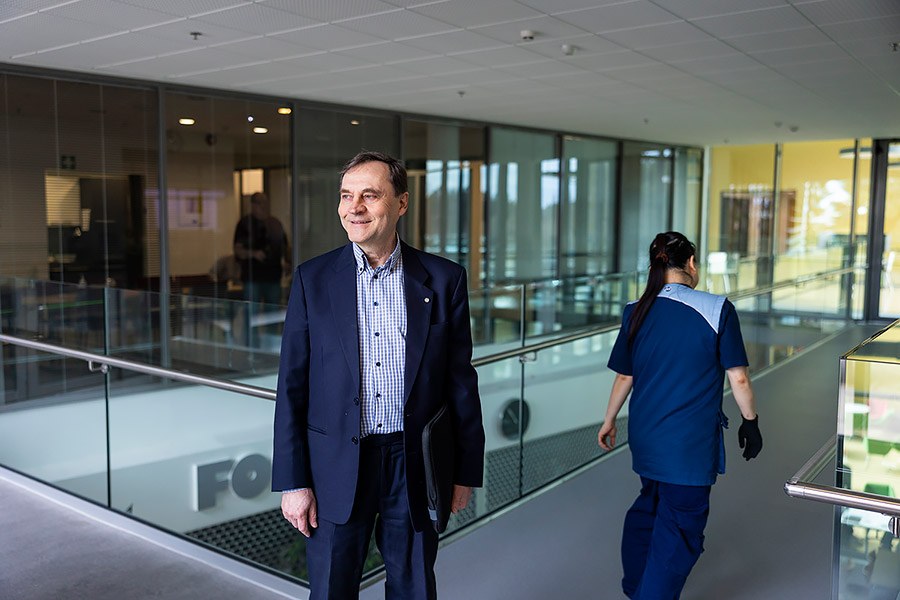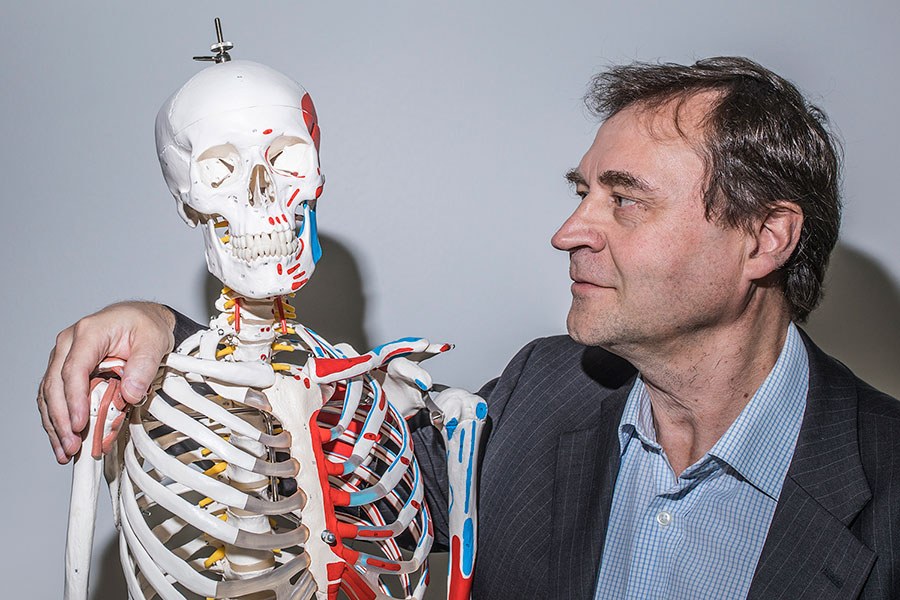Can stress be inherited? Terho Lehtimäki studies the intergenerational transmission of acquired risk factors and develops tomorrow’s laboratory diagnostics

Imagine if the alterations in our DNA triggered by smoking, environmental pollutants or extreme stress could affect not only us but also our children and grandchildren.
It was previously believed that acquired traits could not be genetically inherited across generations. However, subsequent studies on plants and animals have revealed that epigenetic modifications caused by exposure to environmental factors can indeed be transmitted to offspring.
Terho Lehtimäki and his team of researchers are investigating whether these findings can be replicated in humans. Their research data is drawn from the Cardiovascular Risk in Young Finns Study (LASERI), a longitudinal study conducted in collaboration between multiple Finnish universities that stands out for the breadth and depth of its data, as it has followed the same group of people since 1980. Lehtimäki’s study is conducted in collaboration with the LASERI research group.
In 2020, the children and elderly parents of the original cohort members were also invited to participate in the LASERI study. Blood, hair, urine and stool samples – along with semen samples from male participants – were collected for analysis.
“We analyse these samples to determine whether the grandparents, parents and children share the same regulatory RNAs. The results will provide a rough indication of whether epigenetic inheritance can occur in people,” Lehtimäki says.
Regulatory RNAs are molecules capable of preventing a specific gene from encoding a protein. They represent one of the epigenetic mechanisms through which the human body responds to environmental stimuli. When passed on from one generation to the next, these regulatory RNAs could transmit the risk of developing various diseases related to environmental factors from parents to their children and grandchildren.
Lehtimäki and Docent Emma Raitoharju are also launching a new study to look into the intergenerational transmission of the legacy of war. This collaborative study also involves Docent Ville Kivimäki, who works at the Centre of Excellence in the History of Experiences at Tampere University.
“My father spent four years in the trenches – I wonder if it still shows in my DNA?” Lehtimäki reflects.
Omics studies all, not just one molecule
Besides epigenetics, Terho Lehtimäki is interested in all the thousands of molecules that regulate our traits and our risk of developing different diseases.
Lehtimäki's research group conducts omics research, meaning that they analyse all the possible genes and molecules contained in a sample instead of focusing on just one. They use bioinformatics and computational methods to analyse vast datasets.

Lehtimäki’s research group contributed their expertise in genomics to a series of five research papers that recently appeared in Molecular Psychiatry. They identified a large group of genes that influence our temperament, character traits and personality.
“We also compared the modern human DNA to Neanderthal DNA and discovered that Neanderthals lacked some of the genes associated with creativity, which are found only in humans. Did they become extinct due to their lack of creativity?” Lehtimäki ponders.
Another example of omics research is an electronic nose that detects airborne molecules. Lehtimäki has participated in the development of analytical methods for sniffing out signs of, for example, cancers or bacterial infections from clinical samples.
Lehtimäki is also launching a new study where urine samples collected during the LASERI project are analysed with a new and even more sophisticated e-nose device. They are looking to find out whether the e-nose could be capable of detecting, for instance, type 2 diabetes, fatty liver disease or atherosclerosis.
Novel analytics for the benefit of patients
Research that holds promise for improving diagnostics and patient care is what especially inspires Lehtimäki.
He has been involved in investigating susceptibility genes for conditions such as Alzheimer’s disease, familial hypercholesterolemia, lactose intolerance and hereditary thrombophilia. These genes can now be routinely tested in laboratories.
In addition, Lehtimäki has contributed to several studies that led to the establishment of spin-off companies specialising in advanced analytical laboratory instruments.
Notable examples include Nightingale Health, which has developed technology for analysing a wide variety of biomarkers from a single blood sample; Olfactomics focused on creating an electronic nose for cancer surgeons; and Zora Bioscience, which has brought the Hertta test to market for identifying patients at risk of cardiovascular diseases.
“Through our research, we laid the foundation for these spin-offs,” Lehtimäki notes.
Impressive publication record with more than 1,300 papers
One cannot help but be in awe of the astounding breadth of Terho Lehtimäki’s work.
He is a member of more than 40 international research consortia that have identified over 6,000 genetic variants. He has authored more than 1,300 research papers, with more than 100 appearing in the world’s leading medical journals, including Nature, Nature Genetics, Science, Cell, JAMA, NEJM and Lancet. His papers have received more than 150,000 citations.

Lehtimäki's day job involves serving as a Professor of Clinical Chemistry at Tampere University and as Chief Physician at Fimlab Laboratories Ltd. Within the University, Lehtimäki leads a 30-strong research group, teaches medical students, supervises students writing dissertations, trains medical specialists, and actively participates in professional associations and boards.
How does he manage to juggle all these responsibilities?
“I have an excellent team and I know how to delegate. Whenever I run into people I know at work, I given them something to do,” Lehtimäki explains with a laugh.
He also knows how to prioritise and eliminate unnecessary tasks. If he attended all the meetings organised by his more than 40 research consortia, he would do nothing else all day and all night. His solution is to participate only in vital meetings and delegate the less important ones to the members of his research group.
International recognition came as a pleasant surprise
Let’s add one more achievement to Lehtimäki's CV: he skied 900 kilometres last winter.
While enjoying a cross-country skiing holiday in Lapland in April, Lehtimäki received an official-looking email from the International Federation of Clinical Chemistry and Laboratory Medicine (IFCC). The email announced him as the recipient of the 2024 IFCC Award for Significant Contributions in Molecular Diagnostics.
“I was initially sceptical and thought the whole thing was a scam or a prank but eventually had to accept that it was genuine.”
Lehtimäki admits that receiving this recognition felt gratifying. The only other Finns to have received a similar award in the past are Professors Leena Peltonen-Palotie and Olli-Pekka Kallioniemi.
Still, Lehtimäki did not earn the award for toiling away in isolation; rather, it came from his collaborative efforts with other leading researchers.
“Everything I do is based on national or international collaboration. I would advise all young researchers to collaborate and join groups with an established network of contacts.”
Legislation impedes register-based research
Lehtimäki offers another piece of advice for young researchers: do not be discouraged by excessive bureaucracy.
He would, however, prefer to see the Finnish Act on Secondary Use of Health and Social Data overturned, because it significantly hinders register-based research and the sharing of research data among international partners.
The Act, effective since 2019, imposes strict data protection requirements for the secondary use of health and social data in Finland.
“In my 40-year research career, I have never encountered a single data breach. The Act places an undue bureaucratic burden on researchers and stifles research,” Lehtimäki points out.
Terho Lehtimäki
Work: Professor of Clinical Chemistry at Tampere University and Chief Physician at Fimlab Laboratories Ltd. Member of the Academia Europaea.
Education: Completed his Licentiate of Medicine degree and Doctor of Medicine degree in 1992 and his MBA in 2013 at the former University of Tampere. Docent in Medical Biochemistry (former University of Tampere) and Docent in Clinical Chemistry (University of Eastern Finland). Professor since 2002.
News: The International Federation of Clinical Chemistry and Laboratory Medicine (IFCC) recently presented Lehtimäki with the 2024 IFCC Award for Significant Contributions in Molecular Diagnostics.
Family: Spouse and two adult children.
Hobbies: Skiing, cycling, swimming in lakes, spending time in the summer cottage and domestic travel.
Author: Virpi Ekholm





